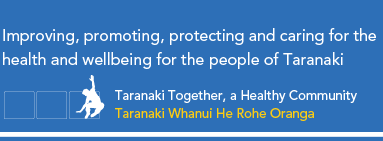Taranaki DHB promotes immunisation for boys and girls to protect against HPV-related cancers
31 March 2017
Taranaki public health nurses and general practices are busy this month protecting a new group of young New Zealanders against HPV-related cancers, with changes to the National Immunisation Schedule now providing free HPV immunisation for everyone aged 9–26, including boys and young men for the first time.
Dr Jonathan Jarman, Taranaki DHB’s Medical Officer of Health said, “HPV causes cancers in men as well as women. The HPV vaccine aims to protect young people from HPV infection and the risk of developing cervical and other cancers later in life.”
The change to HPV immunisation eligibility took effect from 1 January 2017. Those aged 9 to 14 years will only need two doses of the vaccine, spaced at least six months apart, rather than three. An improved vaccine will protect against more strains of HPV. As in previous years, immunisation will be offered through participating schools at Year 8 (around age 12), as well as through general practices to everyone aged 9 to 26.
Dr Jarman said, “There is currently no cure for HPV so immunising children against the HPV infection will significantly reduce the risk of HPV related diseases such as cervical cancer later in life.”
“The HPV vaccine is a safe and effective way to protect against an increasing proportion of mouth and throat cancers caused by HPV, which affect men at higher rates than women. HPV can also cause penile and anal cancers in men,” added Dr Jarman.
In New Zealand approximately 160 women are diagnosed with cervical cancer and 50 women die from it each year. HPV immunisation was introduced in 2008 to reduce the incidence of cervical cancer and other diseases caused by HPV including genital warts.
Taranaki DHB Public Health Nurses have been visiting Taranaki schools and speaking to parents and girls and boys about the HPV vaccine. Year 8 students will be bringing home consent forms with the most up to date information on the safety and effectiveness of the vaccines.
Dr Jarman said “HPV vaccines have an excellent safety rating supported by a significant body of data. HPV immunisation is available in over 125 countries, and over 165 million doses of the vaccine have been distributed worldwide.”
Since the HPV immunisation programme began in New Zealand in 2008, more than 200,000 New Zealand girls and young women have been fully immunised against HPV. The number of abnormal smear tests and cases of genital warts has decreased significantly in young woman since HPV vaccination started.
“I urge parents with queries about the vaccine to discuss them with a qualified doctor or nurse. The Ministry of Health has also published an accurate summary of the most recent international research into the safety of the vaccine and people can also contact the Immunisation Advisory Centre on 0800 IMMUNE.”
To find out more about the free HPV vaccine:
- talk to your doctor, local Public Health Nurse or health centre
- call the Immunisation Advisory Centre free helpline 0800 IMMUNE (0800 466 863)
- visit the www.health.govt.nz/hpv on the Ministry of Health website
- contact the TDHB Public Health Unit Resource Room on 7537777 Ext 8862
ENDS
For more information please call
Cressida Gates-Thompson
Media and Communications Manager
027 7036177


